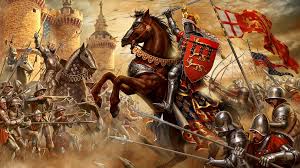martes, 13 de enero de 2015
HUNDRES YEARS´ WAR
The name the Hundred Years’ War has been used by historians since the beginning of the nineteenth century to describe the long conflict that pitted the kings and kingdoms of France and England against each other from 1337 to 1453. Two factors lay at the origin of the conflict: first, the status of the duchy of Guyenne (or Aquitaine)-though it belonged to the kings of England, it remained a fief of the French crown, and the kings of England wanted independent possession; second, as the closest relatives of the last direct Capetian king (Charles IV, who had died in 1328), the kings of England from 1337 claimed the crown of France.
 The war owes its historical significance to multiple factors. By its end, feudal armies had been largely replaced by professional troops, and aristocratic dominance had yielded to a democratisation of the manpower and weapons of armies. Although primarily a dynastic conflict, the war gave impetus to ideas of French and English nationalism. The wider introduction of weapons and tactics supplanted the feudal armies where heavy cavalry had dominated. The first standing armies in Western Europe since the time of the Western Roman Empire originated during the war, composed largely of commoners and thus helping to change their role in warfare. With respect to the belligerents, English political forces time came to oppose the costly venture.
The war owes its historical significance to multiple factors. By its end, feudal armies had been largely replaced by professional troops, and aristocratic dominance had yielded to a democratisation of the manpower and weapons of armies. Although primarily a dynastic conflict, the war gave impetus to ideas of French and English nationalism. The wider introduction of weapons and tactics supplanted the feudal armies where heavy cavalry had dominated. The first standing armies in Western Europe since the time of the Western Roman Empire originated during the war, composed largely of commoners and thus helping to change their role in warfare. With respect to the belligerents, English political forces time came to oppose the costly venture.

Suscribirse a:
Entradas (Atom)